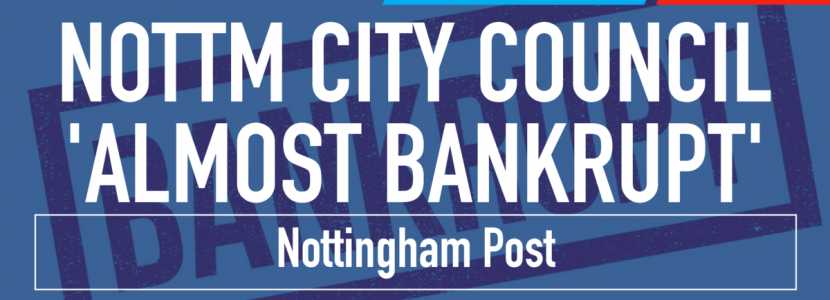
Nottingham City Council on verge of bankruptcy, Government inspector warns in leaked report
The city council is at risk of having to declare bankruptcy without a significant bailout, a Government inspector has warned.
If this happened, it would mean all non-essential spending would be suspended, potentially impacting thousands of jobs.
The council has the highest level of debt to budget ratio, and the second-lowest level of reserves compared to similar-sized cities.
The 'rapid review' was instigated following the collapse of Robin Hood Energy.
The key findings are:
- The council is not in a position to approve a legally-required budget for 2021/22 as things stand. If it cannot do this, it would have to issue a Section 114 notice - effectively declaring itself bankrupt. Government support will be needed to avoid this.
- Government should legally limit how much money the city council is allowed to borrow
- Three year recovery plan to be submitted to Government by next month to plug hole of between £53 and £64 million by 2023/24
- Repeated warnings over long-term financial instability have been ignored for four years
- Further criticism of the use of councillors on the boards of council-owned companies without sector-specific knowledge, and Government should publish nationwide guidance to avoid a repeat elsewhere
- A new Government panel will be set up to monitor progress
- City council projected to lose £38 million from Robin Hood Energy failure
- Long-standing problems not caused by Covid, but it has exposed underlying risk
- “A fundamental culture shift is required” in the way the city council is run
- Council instructed to conduct ‘in depth review’ of all its companies to determine future status of them, and council told to bring some in house
- Financial performance of council-owned companies ‘in many cases deteriorating’ even pre-Covid.
- Council reserves deteriorating year on year, and now second lowest of all core [largest] cities
The inquiry makes eight recommendations to the Government.
In the leaked report, the inspector said bankruptcy - known as a Section 114 notice and issued when a council can't set a balanced budget:
was not inevitable, but could be avoided only with a Government bailout
One of the key problems outlined in the report was the council’s approach to its wholly-owned companies. It has at least a 50 percent share in nine companies, including Nottingham Ice Centre, Enviroenergy and Thomas Bow Asphalt Ltd. Six are 100 percent council owned.
The report found: “There either never was or no longer is a rationale for the portfolio of companies under the council umbrella.
“Some, for example, Nottingham City Transport or Futures, can only be operated in this format if the council wishes to be involved in delivery.
“Many of the others are mainstream council activity and urgent consideration should be given to bringing these back in house sooner rather than later.
“Whatever happens, the council cannot continue to underwrite trading or provide loan capital in the short term and will need to realise returns and seek repayments where possible.
On the subject of setting next year’s budget, it found:
Today, it is clear that the council cannot balance its 2021/22 revenue budget without support.
“It is some way from producing the elements of a coherent recovery plan which will set out how it will get there over a two to three year period and the staging posts along the way.
“Whatever support MHCLG choose to offer, strong mechanisms to hold the council to account in delivering this recovery are required."
Another concern was that for the past four years, despite warnings, there had not been long-term economic planning, but rather budgets based on a year-to-year basis.
The report adds: “There is no strategy setting out how the council will address the financial challenge going forward. There also appears to be a disconnect between the outlook and the decisions the council makes regarding spending, with more and more commitments and risk being added to an already challenging financial position.
“Four years ago, Nottingham started to lose control of their budget. They were advised that they needed to address these issues. Both managerial and political leadership failed to heed these warnings and take the necessary action.
On the issue of the culture of the organisation, it found: “A fundamental culture shift is required together with a much simpler structure, working together, with clear accountability.
In conclusion, it found:
The council approach to companies, its capital programme and revenue budget has layered risk upon risk and the consequences of Covid-19 on the budget has pushed it into the financial position of having a massive ongoing budget gap with depleted reserves.
“With a large budget gap to bridge, limited reserves, funding gaps in the capital programme and unquantified risks the options available to the council to respond to different levels of support that might be provided by MHCLG are limited.”
Read the full Nottingham Post article, here: https://www.nottinghampost.com/news/local-news/nottingham-city-council-…


